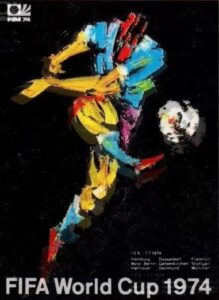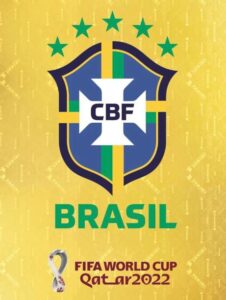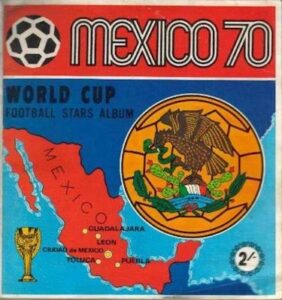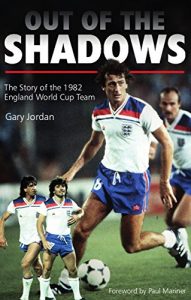2022 World Cup from afar…
 I believe that your relationship with the World Cup can be defined by your very first experience of it. It means that I believe that Europe is dominated by the Dutch and the Germans, the favourites are always the Brazilians who are flawed geniuses and that my own home country, Scotland should always be there and never be beaten but never escape the group stages. 1974, became for me, Muller v Cruyff and I backed the loser.
I believe that your relationship with the World Cup can be defined by your very first experience of it. It means that I believe that Europe is dominated by the Dutch and the Germans, the favourites are always the Brazilians who are flawed geniuses and that my own home country, Scotland should always be there and never be beaten but never escape the group stages. 1974, became for me, Muller v Cruyff and I backed the loser.
And so, 2022, the Dutch and the Germans are there, even if for one it was temporary, and the Brazilians are touted as favourites but are still described as flawed whilst Scotland seem to be giving it a miss. And, of course, as a Scot who watched the ‘74 version, England should not be there… But they are…
Right now, you cannot mention Qatar without the politics. I am in the camp that says this should not be in Qatar. Politics has always been there or thereabouts in football as it was in the 1978 World Cup in the Junta led Argentina whilst in 2018, I am not quite sure how the Russians stacked up…
But it’s there and it is happening, and you cannot ignore how much of a cracking tournament it has been. The group stages have managed to bring some shocks and talking points which show, once more, that the prejudice of the past – Europe good, rest of world, not so good – is increasingly a thing of the past. Colonialism aside, the great game has taken the lessons of the past and not just brought some South Asian flair and samba but some African grit and determination.
This truly feels like a World Cup.
 Europe has suffered some early failures. Germany and Belgium being two of them, but we can also add in everyone’s wee national team – Denmark. Eriksen’s near death experience at the Euros was broadcast across the world and the sympathy brought his nation to our hearts. Unfortunately, it would not bring them to the 2022 knockout phase.
Europe has suffered some early failures. Germany and Belgium being two of them, but we can also add in everyone’s wee national team – Denmark. Eriksen’s near death experience at the Euros was broadcast across the world and the sympathy brought his nation to our hearts. Unfortunately, it would not bring them to the 2022 knockout phase.
Belgium have flattered to deceive for years. If they could just get through on the shoulders of one player, they would have been champions of Europe, the world, the universe, the milky way… But De Bruyne does not a winning side make as they say in Flemish… now…
Germany was inefficient. And a bit rubbish in their first game. It’s all a little, un-German for the Germans. The high standards they set themselves are, of course, based on winning the damn thing so damn often – sometimes because the officials don’t come from the former Soviet Union …
In the Middle East we are quite used to the vast sums of money being offered to players at the tail end of their careers to go over there and play out their last few seasons. What we are less likely to experience is their national teams managing to pull off shocks, like the Kingdom of Saudi Arabia managing to beat Argentina. Of course, not to be outdone, the Japanese were able to knock nails in the German coffin by beating them convincingly. In turn, they then got beat by Costa Rica, so perhaps they shall complain about that, though it might lead to some challenge over balls going over lines and goals not really being goals…
Also emerging were Morocco who borrowed the hammer from the Japanese and set about Belgium and Roberto Martinez’s coffin. They topped the Belgian group. They never lost a game. They are from Africa – what is going on?
 Of those who got out their groups, were damaged in the process but survived? France and Brazil. They got beaten by Tunisia and Cameroon respectively and may feel like they have much still to worry about. France looked vulnerable and whilst Tunisia was perhaps, just getting the French back for having been a French colony which means many of their players could be eligible to play for either country, the French did of course get through the last 16 so the worry was a tad temporary.
Of those who got out their groups, were damaged in the process but survived? France and Brazil. They got beaten by Tunisia and Cameroon respectively and may feel like they have much still to worry about. France looked vulnerable and whilst Tunisia was perhaps, just getting the French back for having been a French colony which means many of their players could be eligible to play for either country, the French did of course get through the last 16 so the worry was a tad temporary.
If Le Blues looked vulnerable, then Brazil looked, well flawed. Of course, Richarlison’ s goal is THE goal of the tournament so far and given that the January window is close I wonder if Spurs will be getting ready to cash in or face off all pirates?
For me, though it was the heartbreak of Group C which captured me. Messi finally looked like he could escape club football and Lewandowski got his goal, was where I think I began to see who may win the tournament. The Poles were perhaps a little fortunate to get out the group – that luck did not last, whilst the Mexicans just fell short, but it was a fascinating storyline which had it all – including the Kingdom of Saudi Arabia making their mark.
If Messi finally emerged, then Ronaldo spoke volumes on a pitch rather than in an interview as he became the first male striker to score in 5 World Cups. The plucky Ghanaians were a delight, and all dressed up like a carnival was about to break out. Unfortunately, such festivity is not encouraged in the likes of Qatar and so they were always going to have to leave their own party. The emergence of Bruno Fernandes, a one-time colleague of Ronaldo at a club in the northwest of England might just have seen us witnessing the beginnings of a challenge for the Golden Boot – a certain Mbappe will have something clearly to say about it.
But will either be in a team that can score 7 in one game like Spain. Their demolition of Costa Rica, which was followed by Costa Rica beating Japan, was indicative of the helter skelter nature of the group stages. There should have been nobody able to touch the Spanish but having made a statement on a world stage they seemed to decide to want to mumble on the side-lines thereafter.
Also emerging from the group stages was Australia. Their team is littered with players who have made their careers in British – often even Scottish – football. So far, they have been relatively unexciting.
As one former colony managed to make it through, another, Canada, departed. One of the lessons that Canada brought was the value to their players of having the World Cup as a platform for them – a few have been mentioned now as targets for Premiership clubs.
 And so, what of England? There were a few people who hoped that their sterling work in the Nations League with their form in that competition would transfer into this tournament… Aside from one game, Southgate’s Surrogates have got through. The second half against Wales was ruthless. You would have thought they could have come together with mates and agreed two goals a start and jumpers as goal posts to allow the other home country to progress but no, not even for mates… It makes expectation for a team which was last to falter at a major competition at the very last game, rise to the point of near fervour. I feel for them. They went on to face a team who managed what they could not – to win their continental championship – Senegal. To be fair Senegal managed to get through a group which included the Dutch who are always a hit or miss, the Qataris, and the one team that ought to have got through – Ecuador. They could be called lucky rather than plucky, but their luck ran out. Meanwhile, England’s failure to beat a team who cannot even spell football, the USA, showed that England can be thwarted. It took the Dutch to split the bill and dandily stop the Yankee Doodle.
And so, what of England? There were a few people who hoped that their sterling work in the Nations League with their form in that competition would transfer into this tournament… Aside from one game, Southgate’s Surrogates have got through. The second half against Wales was ruthless. You would have thought they could have come together with mates and agreed two goals a start and jumpers as goal posts to allow the other home country to progress but no, not even for mates… It makes expectation for a team which was last to falter at a major competition at the very last game, rise to the point of near fervour. I feel for them. They went on to face a team who managed what they could not – to win their continental championship – Senegal. To be fair Senegal managed to get through a group which included the Dutch who are always a hit or miss, the Qataris, and the one team that ought to have got through – Ecuador. They could be called lucky rather than plucky, but their luck ran out. Meanwhile, England’s failure to beat a team who cannot even spell football, the USA, showed that England can be thwarted. It took the Dutch to split the bill and dandily stop the Yankee Doodle.
Croatia, Switzerland and South Korea also got through their groups but not many are seeing them as genuine contenders. Croatia ducked behind the Moroccans and held back the Belgians so it might be that their progress has more to do with a certain Modric and the lack of quality brought to Qatar by the world number 2s – Belgium. The Swiss were second to the Brazilians in a fairly perfunctory series of games which might make them ready to expect things to stay perfunctory: they may be in for a shock. South Korea, having managed to build a national side during and after their home tournament into a world force, made Luis Suarez cry. Quiet a few people love the South Koreans.
Aside from all that, the appearance of the very first all-female refereeing complement, the controversy over whether the Iranian football team sang their national anthem properly and the Germans making a point by holding their hands to their mouths, this has been a VAR and extra time World Cup. VAR has not been as advertised. It sorts little out and delays things. People suggested it would resolve the arguments. It has only gone and created new ones. Why? Because it is operated by humans. And humans are… humans.
The additional time being played could suggest that we have a last goal the winner rule for the final OR we could be waiting until 2024 for the result. And we all know there is nothing that would ever cancel the football like a pandemic …
 I have to say I am looking forward to the rest of the tournament. As to who will win it, my heart wants Brazil, especially given the current state of health of my all-time favourite player, Pele, but my head says that Argentina look likely. And as for England, well, now they face the French next, the place to head to is Leeds for that game. Matchroom are about to announce a fan friendly event at their world title fight between IBF featherweight champion Josh Warrington and Luis Alberto Lopez. In the First Direct Arena they plan to interrupt the night of fighting to show the game. Thereafter there shall be fighting. It will be interesting to see if that is in a ring or in a crowd outside the ring…
I have to say I am looking forward to the rest of the tournament. As to who will win it, my heart wants Brazil, especially given the current state of health of my all-time favourite player, Pele, but my head says that Argentina look likely. And as for England, well, now they face the French next, the place to head to is Leeds for that game. Matchroom are about to announce a fan friendly event at their world title fight between IBF featherweight champion Josh Warrington and Luis Alberto Lopez. In the First Direct Arena they plan to interrupt the night of fighting to show the game. Thereafter there shall be fighting. It will be interesting to see if that is in a ring or in a crowd outside the ring…
And you heard it here first… from a Scotsman…
And see, you can get through something on the World Cup without mentioning 1966…
Oops…
Donald C Stewart
Follow on Twitter @CommuneArts
 In the Introduction to In the Heat of the Midday Sun, Steven Scragg puts forward, a theory “that you’re chemically wired to your first World Cups.”
In the Introduction to In the Heat of the Midday Sun, Steven Scragg puts forward, a theory “that you’re chemically wired to your first World Cups.”
 For many football fans in England, the 1982 World Cup in Spain is simply remembered for the fact the Three Lions were eliminated from the tournament despite not losing a game: a footnote, nothing more than a pub quiz question. However, there is so much more to this oft repeated simplistic one-line memory of England at the 12th Copa del Mundo Finals.
For many football fans in England, the 1982 World Cup in Spain is simply remembered for the fact the Three Lions were eliminated from the tournament despite not losing a game: a footnote, nothing more than a pub quiz question. However, there is so much more to this oft repeated simplistic one-line memory of England at the 12th Copa del Mundo Finals.